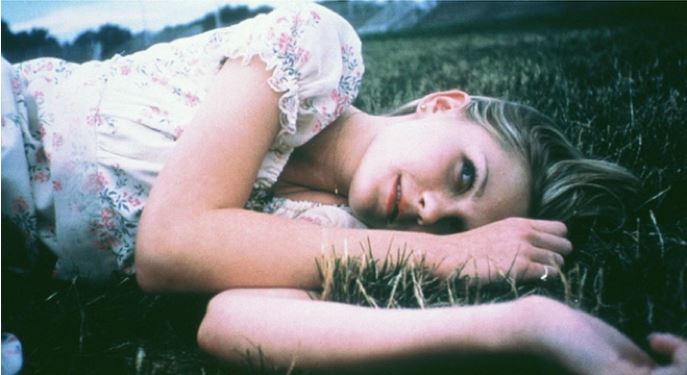Dani Klemes, web editor-in-chief
At the center of the tragic and alluring world of “The Virgin Suicides” (2001) are the five Lisbon sisters—blonde, angelic and all covertly suicidal. Based on the novel by Jeffrey Eugenides and directed by Sofia Coppola, “The Virgin Suicides” diverges into a hauntingly complex narrative that follows the ephemeral lives of the Lisbons (Cecilia, Lux, Bonnie, Mary and Therese) and the bittersweet memory they left behind.
Set in the dreary, suburban outskirts of Detroit, Mich., during the 1970s, “The Virgin Suicides” is narrated omnisciently by a man who speaks on behalf of ‘we’: all the neighborhood boys who lusted after the Lisbon sisters 25 years ago. Seeing life through the eyes of the narrator, the audience is captivated by the enthralling, seemingly-perfect Lisbons.

But this lulling perspective of the Lisbon family is short lived. After the abrupt suicide of the youngest Lisbon, 13-year-old Cecilia (played by Hanna Hall), the sisters’ stern mother, Mrs. Lisbon (played by Kathleen Turner), desperately searches for a scapegoat for the teenage angst smoldering within her drab home. In an attempt to “protect” her daughters from the sinful world of boys and sex, Mrs. Lisbon adds fabric to their prom dresses, enforces a strict curfew and ultimately pulls them out of school to isolate them from all sin. In Mrs. Lisbon’s mind, her hysteria equates to nothing more virtuous than maternal instinct. Though Mr. Lisbon (played by James Woods) is more lenient with the disciplining of his daughters, he is emasculated by his strong-willed wife.
Within the span of a year, the sisters are all dead. Within a year of homecoming dances, football games and first loves, the once smiling and twirling Lisbons, doe-eyed and naïve, are dead.
We know from the title of the movie that the girls kill themselves. The point of the film is not to analyze what happened to them or even to question their suicides. The whole purpose is that there is a lack of reasons and answers for the film’s events. Coppola approaches the film with an air of mystery, leaving interpretations and explanations up to the viewers. She is content with her subtle adaptation and focuses solely on the idea of retention: in the neighborhood boys’ eyes, the Lisbons are eternally preserved as the living, breathing, perfect creatures they were when they were last seen.
The film methodically shifts from the ethereal whims of the Lisbon girls to the somber actuality of their deaths. Edward Lachman’s cinematography carries the story through the major points of stilted adolescence and loss of innocence, consistently possessing an air of nostalgic glam. Collectively, Coppola’s rendition of the acclaimed novel is gracefully surreal. Rather than honing in on the easy, clichéd themes of youthfulness, the film constantly explores bolder, more taboo elements that most ‘coming of age’ films shy away from.
Altogether, “The Virgin Suicides” is a treasure that raises difficult questions about life and lust. Through the excellent cast (including Kirsten Dunst and Josh Hartnett) and the eery score (featuring French duo Air’s “Playground Love”), “The Virgin Suicides” serves as a reflection of the complexity present in the everyday lives of teenagers.
At the beginning of the film, a doctor tells Cecilia that she is “not even old enough to know how hard life gets.” Perhaps it is Cecilia’s meek nature or perhaps it is her sage apprehensiveness, but when she responds that the doctor obviously “doesn’t know what it’s like to be a 13-year-old girl” she speaks to the theme that youth doesn’t equate to bliss, a thought-provoking idea that sanctions this film a 7 out of 10.




































individual taxes • Sep 22, 2014 at 2:47 pm
Thank you a lot for sharing this with all people you actually recognize what you’re
talking about! Bookmarked. Kindly additionally visit my site =).
We may have a link exchange contract among us
quickesthuman8521.newsvine.com • Aug 11, 2014 at 2:19 am
Thanks in favor of sharing such a fastidious idea, piece of writing
is pleasant, thats why i have read it completely